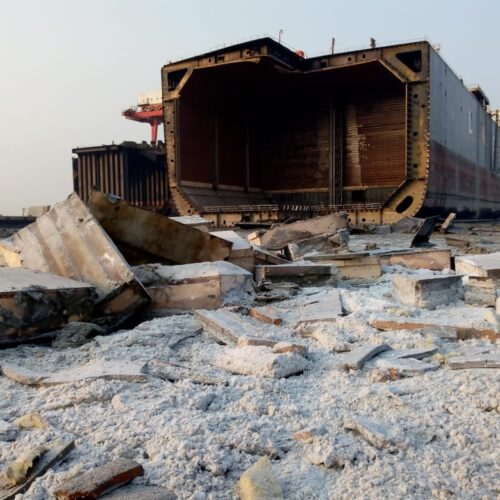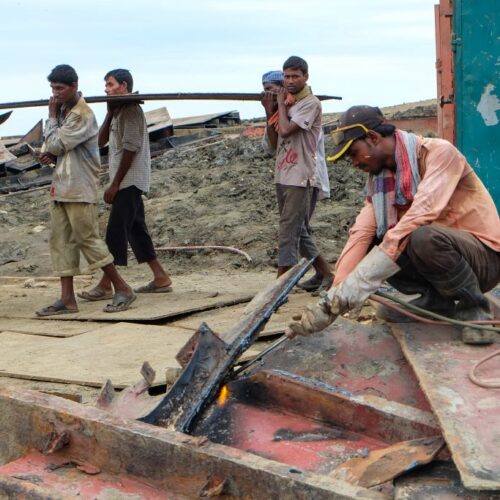The Problem
Just as the goods they transport, ships too become waste when they reach the end of their operational lives. When compared to sinking or abandonment, recycling is by far the most environmentally-friendly and economically sound way of getting rid of old ships, as it ensures the reuse of valuable resources such as steel, iron, aluminium and plastics. Today, however, only a fraction of end-of-life ships is handled in a safe and clean manner. Shipbreaking is a heavy and hazardous industry that exposes both workers and the environment to a great number of risks.
Around five hundred ocean-going commercial vessels reach the end of their service life each year. While up until the 1970s ships were dismantled mainly in Europe and the United States, when social and environmental protection laws became stricter, the industry shifted to areas where legal frameworks are weaker. Today, the vast majority of ships are broken on only three beaches in South Asia.
More than 70 percent of obsolete ships end up in South Asia, where they are broken under rudimentary conditions on the beaches of Alang-Sosiya in India, Chattogram (formerly known as Chittagong) in Bangladesh and Gadani in Pakistan - a practice known as ‘beaching’. The human costs and the environmental impacts of beaching are devastating, and the negative consequences of the shipbreaking industry in these countries are felt by many. On the one hand, workers, often exploited migrants, lose their lives and suffer injuries and occupational diseases due to unsafe working conditions and exposure to toxic substances. On the other hand, coastal ecosystems and the local communities depending on them are devastated by toxic spills and other types of pollution due to the lack of infrastructure to contain, properly manage and dispose of hazardous materials.
Turkey is the other main destination for end-of-life vessels. Facilities operating in the rest of the world account for only 3 percent of ships scrapped globally every year. In some yards located in these countries, even though safer and cleaner ship recycling methods are used, concerns related to poor hazardous waste management and breaches of labour rights exist.

AVOIDING RESPONSIBILITY: CASH BUYERS AND FLAGS OF CONVENIENCE
The shipping industry – most of it based in Europe and East Asia – is rarely held accountable for the negative impacts caused by shipbreaking on tidal beaches. It is extremely easy for a ship owner to circumvent existing laws that aim at protecting vulnerable communities and the environment from the dumping of toxic waste.
With the exception of responsible shipping companies that directly engage with recycling facilities, most ship owners sell their vessel to scrap dealers, known as cash buyers, who bring the vessels to their final destination and are inherently linked to the beaching yards. By using cash buyers as middle men, ship owners seek to obtain the highest price and to avoid legal, financial and other risks related to selling ships for breaking. Cash buyers change the flags of the ships to typical last voyage flags of convenience and register the vessels under new names and post box companies, often located in a tax haven. Flags known for their poor implementation of international maritime law, such as Comoros, Palau and St Kitts and Nevis, are particularly popular with cash buyers. The use of post box companies and flags of convenience renders it very difficult for authorities to trace and hold cash buyers - and the ship owners that sell to these scrap-dealers - accountable for illicit practices.
When selling their ships to beaching yards via cash buyers, ship owners prioritise high scrap prices at the detriment of human lives and the environment as they benefit from the exploitation of workers and the weak enforcement of environmental regulations.
Latest News

Platform News – CirclesOfLife leads the charge toward sustainable shipyard practices
Comprising members from shipyards, industry associations, civil society organizations, academia, and classification societies, CirclesOfLife is a consortium committed to driving progress toward circular, zero-impact shipping through collaborative efforts.
... Read More

